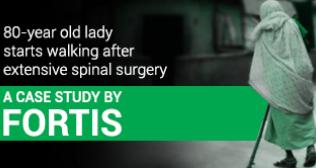
Brain Tumours | Which ones need surgery
Tumours are some of the most commonly occurring neurological diseases in the human body and brain tumours are the tenth leading cause of morbidity in India. The last few years have seen a considerable jump in the number of diagnosed cases of different types of tumours across all age groups. On an average, there are more than 500 diagnosed cases of brain tumours worldwide every day.
A brain tumour can either be a cancerous or non-cancerous mass of abnormal cells in the brain. The non-cancerous type of tumours is benign, whereas the cancerous ones are malignant in nature. Cancers originating from other parts of the body can spread to the brain, or even originate in the brain. There are more than 1 million cases of brain tumours diagnosed per year in India. A brain tumour can start growing in any part of the brain and the location and growth rate can determine the effect on the nervous system.
The signs and symptoms of a brain tumour, as well as the treatment options, depend on the size, location of the tumour and its rate of growth. Some of the most general signs and symptoms of brain tumours are different patterns of headaches, frequent and severe headaches, loss of sensation or movement in any of the limbs, unexplained nausea, speech and balance difficulties, extreme fatigue, changes in personality and behaviour, seizures in individuals without any history of epilepsy and at times auditory issues. Our team of neurologists and neurosurgeons at Fortis Hospital always recommend making an appointment with the specialist if the above signs and symptoms are persistent and interfere in daily activities.
Brain tumours can be classified as primary brain tumours that originate in the brain itself or its surrounding tissues, and secondary brain tumours that originate from other parts of the body and then metastasise to the brain.
Primary brain tumours occur due to changes or mutations in the DNA of the normal cells. These mutations cause the cells to rapidly grow and divide thus destroying healthy cells, the result of which is a mass of abnormal cells which then develops into a tumour. Primary brain tumours are less common in adults and different types exist, each getting its name from the type of cells. Some examples of primary brain tumours are meningiomas, gliomas, medulloblastomas, and pituitary adenomas.
Secondary brain tumours usually occur in individuals who have a history of cancer and are more common in adults than primary brain tumours. Some of the common types of cancers that are formed in other body parts but can spread to the brain are breast cancer, kidney cancer, lung cancer, colon cancer and melanoma.
The neurologists at Fortis Hospital state that certain risk factors such as exposure to radiation and a family history of brain tumours can increase the risk of the development of a brain tumour.
Our team of doctors may recommend several tests and procedures including a neurological exam to check the vision, hearing, balance, and coordination that could highlight any part of the brain that is affected by a brain tumour. Imaging tests such as MRI are commonly used to diagnose brain tumours and can help evaluate the tumour and plan the treatment accordingly. Biopsy tests are usually recommended to determine if the tumour is cancerous or benign and can then further dictate the next appropriate treatment plan.
Surgery is usually the primary treatment for brain tumours that do not cause severe damage on removal. Benign tumours can be successfully treated by surgery but malignant tumours require additional treatment such as radiation or chemotherapy along with surgery.
If the cancer has metastasised to a large extent or is near a vital structure they are termed as inoperable or unresectable, in such cases, surgery cannot be performed. Partial removal of the cancerous tumour can relieve the symptoms to a great extent. The individual's age, type of tumour, location in the brain, and its response to treatment greatly determines whether a brain tumour is operable or not. The risk of damaging nearby brain tissues is one of the most important reasons to deem a brain tumour inoperable.
While brain tumours are a fairly common occurrence, there are over 120 different types of brain tumours that are found in the human body. The primary goal is to remove as much of the tumour or the entire tumour through surgery which greatly reduces the chance of recurrence. In some complex cases, the bulk of the tumour is removed surgically and the residual tumour is treated with radiation if it is in the vicinity of a vital structure. Your neurologist and neurosurgeon will determine if the tumour can be treated by surgery alone or would require additional treatment.
Categories
Clear allMeet the doctor

- Neurosurgery | Neurosurgery
-
15 Years
-
2000



















